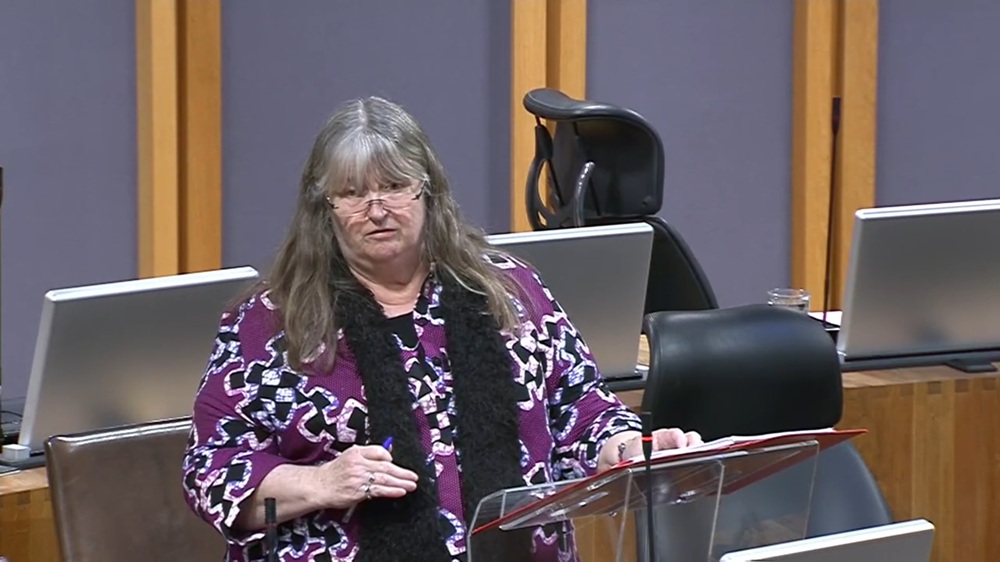Call for roll-out of family drug and alcohol courts

Chris Haines, ICNN Senedd reporter
Senedd members called on the Welsh Government to roll out family drug and alcohol courts across Wales to keep more children out of care.
James Evans raised an independent evaluation of a Welsh pilot of family drug and alcohol courts, an alternative family court for care proceedings that offers specialist support.
The Conservative said the 2024 study found positive outcomes, suggesting family drug and alcohol courts are feasible and beneficial alternatives to standard care proceedings.
He urged the Welsh Government to roll out family drug and alcohol courts across Wales, following the two-year pilot in Cardiff and the Vale which ended in November 2023.
Rhys ab Owen, who sits as an independent, was disappointed by continued delays in reestablishing the court and opening others.
‘Stunned’
During counsel general questions on January 21, Mr ab Owen said analysis shows the court costs £18,000 but produces an average direct benefit of more than £74,000 for each case.
Welsh Lib Dem leader Jane Dodds, who was a child protection social worker for 27 years, added her voice to the chorus of cross-party calls for family drug and alcohol courts.
She told the Senedd: “I am slightly stunned that we are not learning from England and we are not looking at the outcomes there and accelerating this…. We have families right now who are desperate to be kept together through a system that I have seen myself working.”
Julie James, who is counsel general, the Welsh Government’s chief legal adviser, explained that a working group has been set up to advise on the next steps by the summer.
Seeking to pin the minister down, Ms Dodds said: “The summer could start in March if we’re lucky or … could go on until October.” Ms James said she hoped to report back before summer recess in late-July.
‘Delivery’
The Conservatives’ Paul Davies questioned Ms James on her appointment as minister for delivery in September, “a role that many people believe is unnecessary”.
Mr Davies said the role suggests the first minister lacks confidence in her cabinet, asking what has been achieved in the new role so far and suggesting nothing has been gained.
He told the Senedd that Wales has the highest NHS waiting lists, the worst educational performance and highest unemployment rate in the UK.
Ms James explained her role is to provide oversight of the programme for government, ensuring cross-government buy-in to overcome barriers wherever possible.
Rejecting the premise of the questioning, she said: “Most governments across the world have delivery arms or delivery offices inside them including many of the previous Conservative governments – I have to say, with little or no effect.”
‘Forever chemicals’
Plaid Cymru’s Delyth Jewell raised concerns about so-called forever chemicals contaminating former industrial sites such as the Ty Llwyd quarry, near Ynysddu.
Ms Jewell highlighted UK-wide calls for Zane’s law in memory of a seven-year-old boy who died from contaminated floor water that had passed through a historic landfill site.
She backed calls for stricter registration of contaminated law, fuller inspections and for the original polluter to pay, with Caerphilly council set to consider such a motion.
Saying she would be happy to meet campaigners, Ms James pointed to ministers’ contaminated land strategy and a fund for developers to bring sites back into use.
She applauded the work of Swansea University which helped transform Kilvey Hill in Swansea from “looking like a moonscape” to being completely covered in vegetation.
‘Betrayal’
Ms Jewell called for an update on the plight of women born in the 1950s who have been refused their state pension by the UK Government.
She said: “These women have suffered a double injustice, firstly by having their state pensions denied them and, secondly, by having a Westminster government that used to acknowledge that fact but now refuses to give them what they’re owed.”
The deputy leader of the Plaid Cymru group in the Senedd said the women affected feel betrayed and tired of waiting for the UK Government to do what is right.
Ms James, who stressed that powers over pensions are not devolved to Wales, said she was herself born in the 1950s and had her pension age delayed considerably.
She said: “I am, however, very fortunate to still be working and not so dependent on the pension. I have two very, very good friends who have died without having a resolution to this, both of whom would have suffered very much from the change in the pension age.”
Support our Nation today
For the price of a cup of coffee a month you can help us create an independent, not-for-profit, national news service for the people of Wales, by the people of Wales.





